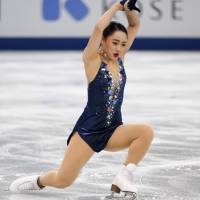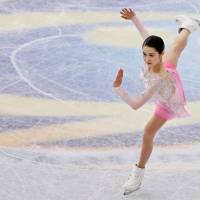Satoko Miyahara and Wakaba Higuchi came into the Grand Prix Final with excellent chances to solidify their positions as the favorites for Japan's two spots for women for the Pyeongchang Olympics.
They didn't do it.
After outstanding short programs by both, things came undone in their free skates and the final results saw them finish fifth (Miyahara) and sixth (Higuchi) in the six-woman field at the prestigious event won by Russia's Alina Zagitova.
So now, with next week's Japan nationals in Tokyo looming, the drama deepens.
A few weeks ago, after a poor showing at the NHK Trophy, Miyahara looked like she had little chance of making the team. Then came a reversal of fortune with a victory at Skate America and entry into the GP Final as a substitute.
Now the pendulum has swung back and it's anybody's guess as to who the lucky two will be.
By Ice Time's mathematical calculations, there are 21 different possibilities for the two-woman team from contenders Miyahara, Higuchi, Mai Mihara, Kaori Sakamoto, Marin Honda, Rika Hongo and Yuna Shiraiwa.
Three-time U.S. champion Johnny Weir, commentating for NBC on the GP Final, provided an accurate analysis of the situation.
"The Japanese ladies were dominant for so many years," Weir stated. "You think back to names like Shizuka Arakawa, Miki Ando, Mao Asada. As of late it has been such a mishmash of who's injured, who's not injured, who has the triple-triple, who doesn't, who cheats too much (on jump rotations).
"They are looking for that leading lady going into the Pyeongchang. With only two spots, it is going to be a really tough competition at nationals."
Miyahara was bedeviled once again by under-rotations in her free skate, three of them to be exact. Higuchi doubled a triple salchow and a triple lutz, and had an edge call on her triple flip.
The Olympic Channel's Ryan Bradley gave his assessment of Miyahara's jumps after her short program to "Memoirs of a Geisha."
"She doesn't get a lot of power in these jumps. She's a rotator," Bradley said. "So she gets a ton of torque as she leaves the ice. Hits a very high top speed in that rotating position, which doesn't quite give as much speed and power through the jump as someone like (Canada's) Kaetlyn Osmond."
NBC's Terry Gannon catalogued Miyahara's battle with physical challenges over the past year after her free skate to "Madame Butterfly."
"It has been a courageous comeback from injury for Satoko Miyahara," Gannon commented. "She fractured her left hip last January, injured her left foot in July, suffered hip inflammation in September. Now putting those injuries behind her. She is close to being back to her best."
The technical panel disagreed, however, after reviewing her jumps.
Higuchi earned high praise for her short program to "Gypsy Dance" from the analysts.
Eurosport's Chris Howarth was effusive with his commentary.
"That was absolutely brilliant," Howarth stated. "I loved the way the program really, really built. Fabulous piece of footwork, which she used every nuance in the music. Got the crowd right behind her. That continued right to the end of the program. Fantastic."
It was more of the same from Bradley.
"What's grown so much on Wakaba is her presentation," Bradley commented. "She's really embracing the PCS (program component scores). Wanting to be one with the performances. She continues to get stronger and stronger.
"What is easy to forget is that she is only 16 years old. She still has a lot of developing to do. She is such a powerful jumper. Her improved components are going to keep her in the conversation for a long time to come."
When it came to her free skate to "Skyfall," Eurosport's Simon Reed wondered if the home audience didn't rattle the Tokyo native.
"Something happened there after the first minute and a half," Reed noted. "She got off to a fabulous start. I wonder if the crowd made a bit of a difference. She became conscious of them."
Even while acknowledging Higuchi's mistakes in the free skate, Howarth remained upbeat about it.
"There were costly mistakes. Rotation is king," Howarth said. "When you start doubling out, you are throwing big, big points away.
"For the start of the program, it was sensational. Love the concept. Love the way she portrayed the Bond girl. I thought the whole concept of the program was great."
So the countdown begins. Ice Time just wants to see a fair competition, with no politics entering into the selection process.
The rules say that the winner of the Japan nationals makes the Olympic team.
I think there is a chance that Sakamoto could win, and I hope she will be judged fairly. Miyahara, Higuchi and Mihara all have bigger names and reputations than Sakamoto, but that should not matter if there is to be legitimacy to the process.
When Miki Ando made the Olympic team for the 2006 Turin Games over Yukari Nakano in late 2005, skating had still not entered the stratosphere of popularity it currently enjoys in Japan, and there was only mild controversy.
It's an entirely different story this time. The eyes of the skating world will all be watching and the judges and Japan Skating Federation must be mindful of this.
Narrow loss for Uno
Shoma Uno lost out on the GP Final gold to American Nathan Chen by exactly half a point. Uno, who took home the bronze in the event the past two seasons, had an unfortunate fall on the triple axel in his short program to "Winter" and was also penalized for going over the allotted time.
If either of those infractions doesn't occur, Uno takes home the gold.
Bradley cited the cost of Uno's untimely fall in the short program.
"If he hits that triple axel, he would virtually be untouchable in the short program with a beautiful quad flip and quad/toe combo," Bradley pointed out.
Howarth gave high marks to Uno for his short program.
"Beautiful program. Absolutely fantastic," Bradley stated. "The quad flip, he makes it looks so easy. He sells it (the program) fantastically, the spins are great."
Howarth liked the setup of the program.
"The key thing in that program for me was the big combination and the triple axel in the second half, so he is going for that extra 10 percent," Howarth commented. "At the end of the day, when it comes down to the nitty gritty at the Olympics, it's going to be things like that that will decide who gets gold, silver and bronze."
Uno fell on his opening quad loop his free skate to "Turandot," was only credited with one combination and received poor grades of execution on his quad toe loops.
He won the free skate despite all of this, and two months out from Pyeongchang the feeling here is that his medal prospects remain very bright.
Historic first for Kihira
Japan junior champion Rika Kihira finished a disappointing fourth in the Junior GP Final against five Russian competitors, but did make some history in the event won by Alexandra Trusova.
She scored a season's best of 66.82 in her short program to "Kung Fu Piano" and ISU announcer Ted Barton appreciated Kihira's artistry.
"The sensitivity, the choreography and the movement, emotional commitment in her face," Barton said.
Kihira was fourth going into the free skate and appeared well positioned to make the podium with two triple axels planned.
The 15-year-old had the crowd roaring with a huge triple axel/triple toe loop combo at the outset of her free skate to "La Strada," but singled her second triple axel and then under-rotated her triple flip, which eliminated her medal chances.
Barton noted the historical achievement in Kihira's free skate.
"You've just witnessed history. This little lady produced a triple axel/triple toe loop (combination)," Barton stated. "Never done before in junior competition by a woman. Today was the day.
"She had a great skate at the end with the circular step sequence. What a great program. Fierce and determined."
Barton saluted Kihira for the way she worked her way through the free skate.
"One of the keys to landing your first very difficult combination or jump in a program in competition is to keep yourself calm and don't forget about the rest of the program," Barton noted.
Mitsuki Sumoto, Japan's junior champion, earned the bronze in the men's JGP Final that was won by American Alexei Krasnozhon and displayed great potential for the future.
Juniors out in force
One of the wonderful sights at the GP Final was seeing all of the juniors that turned out to support their fellow skaters.
Ice Time spoke to Mako Yamashita, Nana Araki, Yuhana Yokoi, Saya Suzuki, Akari Matsuoka, Rino Kasakake and Tatsuya Tsuboi, who were all in attendance at various points during the week. Several of them came on multiple days.
It was heart-warming to see the kids cheer not only their compatriots, but all of the skaters who competed. They all know what kind of courage it takes to be out there on the ice by themselves.
Ominous news on Hanyu
Sunday's announcement from JSF director Yoshiko Kobayashi that world champion Yuzuru Hanyu has not returned to training on the ice after more than a month off is not a good sign.
Hanyu's injury was initially diagnosed as a sprained collateral ligament in his right ankle, but Kobayashi referenced his knee in her comments at the GP Final.
With less than two months to go now until Pyeongchang, the clock is ticking. The latest news almost certainly means Hanyu will not skate at next week's nationals.
The bigger question surrounds the realistic outlook going forward. If Hanyu is going to have any chance at defending his Olympic title, he will have to be back on the ice soon.
Furthermore, my belief is that Hanyu will need at least one tuneup event before the Olympics if he is able to compete. That means the Four Continents Championships in Taipei (Jan. 22-27) would be the place.
Coming three weeks before the men's singles in Pyeongchang, this would give Hanyu a chance to evaluate where he is and still provide time for final adjustments before the Olympics.
In the final analysis, if rest and rehabilitation don't heal Hanyu's injuries, he may have to resort to pain-killing injections in his bid to become the first man since American Dick Button some 65 years ago to retain the Olympic title.




